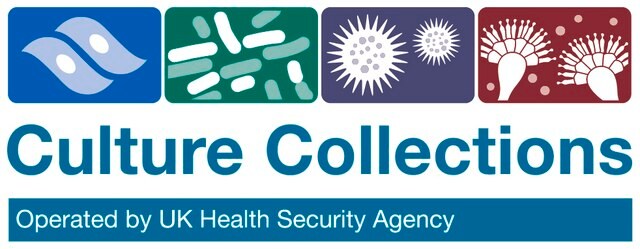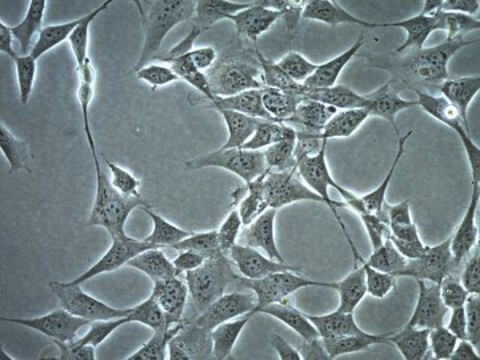SCC290
D425 Med Human Medulloblastoma Cell Line
D425 Med human medulloblastoma cell line is representative of a common aggressive form of medulloblastoma and is a well-established disease model.
Synonyme(s) :
D425 Med Cell Line, Human Medulloblastoma Cells, Medulloblastoma Cell Line
Se connecterpour consulter vos tarifs contractuels et ceux de votre entreprise/organisme
About This Item
Code UNSPSC :
41106514
Nomenclature NACRES :
NA.81
Produits recommandés
Application(s)
cell analysis
Description générale
Medulloblastoma is one of the most common malignant brain tumors in children, with the highest number of diagnoses occurring in patients between 6 and 8 years of age (1). Medulloblastomas are subdivided into four subtypes based on molecular genetic characteristics: WNT, sonic hedgehog (SHH), group 3 and group 4 (1). Of these, group 3 is characterized by amplification of the oncogene MYC, one of the most common gene alterations associated with medulloblastoma.
The D425 Med human medulloblastoma cell line is one of the most highly cited cellular models for medulloblastoma and is classified as a subgroup 3, harboring MYC amplification as well as mutant P53 (2). The D425 Med medulloblastoma cell line was derived from tumor cells of 6-year old patient and grows as suspended or lightly-adherent cell clumps in culture. D425 Med medulloblastoma cells are positive for neurofilament proteins but negative for GFAP (3).
<bold>Source:</bold>
The D425 medulloblastoma cell line was derived from biopsy of a tumor from a 6-year-old male patient (2).
Research Category:
Cancer
The D425 Med human medulloblastoma cell line is one of the most highly cited cellular models for medulloblastoma and is classified as a subgroup 3, harboring MYC amplification as well as mutant P53 (2). The D425 Med medulloblastoma cell line was derived from tumor cells of 6-year old patient and grows as suspended or lightly-adherent cell clumps in culture. D425 Med medulloblastoma cells are positive for neurofilament proteins but negative for GFAP (3).
<bold>Source:</bold>
The D425 medulloblastoma cell line was derived from biopsy of a tumor from a 6-year-old male patient (2).
Research Category:
Cancer
Origine de la lignée cellulaire
Human, Cancer Cells
Conditionnement
≥1X106 cells/vial
Stockage et stabilité
Store in liquid nitrogen. The cells can be cultured for at least 10 passages after initial thawing without significantly affecting the cell marker expression and functionality.
Autres remarques
This product is intended for sale and sold solely to academic institutions for internal academic research use per the terms of the “Academic Use Agreement” as detailed in the product documentation. For information regarding any other use, please contact licensing@emdmillipore.com.
Clause de non-responsabilité
RESEARCH USE ONLY. This product is regulated in France when intended to be used for scientific purposes, including for import and export activities (Article L 1211-1 paragraph 2 of the Public Health Code). The purchaser (i.e. enduser) is required to obtain an import authorization from the France Ministry of Research referred in the Article L1245-5-1 II. of Public Health Code. By ordering this product, you are confirming that you have obtained the proper import authorization.
Unless otherwise stated in our catalog or other company documentation accompanying the product(s), our products are intended for research use only and are not to be used for any other purpose, which includes but is not limited to, unauthorized commercial uses, in vitro diagnostic uses, ex vivo or in vivo therapeutic uses or any type of consumption or application to humans or animals.
Code de la classe de stockage
10 - Combustible liquids
Classe de danger pour l'eau (WGK)
WGK 1
Certificats d'analyse (COA)
Recherchez un Certificats d'analyse (COA) en saisissant le numéro de lot du produit. Les numéros de lot figurent sur l'étiquette du produit après les mots "Lot" ou "Batch".
Déjà en possession de ce produit ?
Retrouvez la documentation relative aux produits que vous avez récemment achetés dans la Bibliothèque de documents.
Notre équipe de scientifiques dispose d'une expérience dans tous les secteurs de la recherche, notamment en sciences de la vie, science des matériaux, synthèse chimique, chromatographie, analyse et dans de nombreux autres domaines..
Contacter notre Service technique




